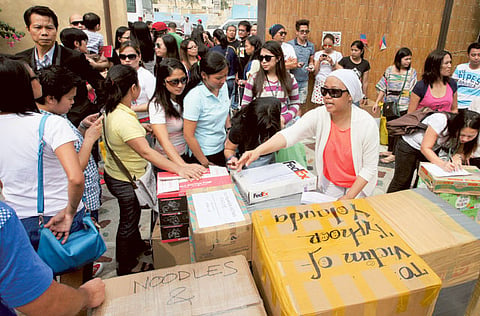Ater Typhoon Haiyan: Philippines senate panel to monitor disbursement of relief funds
Congress to allocate P55.4b for rehabilitation of infrastructure damaged by recent natural disasters

Manila: Amid increasing concerns over whether funds gathered for calamity response are being properly spent by the government, a move is now gathering support in the Senate to ensure that the allocation goes to its intended projects.
“We assure that the Congress will fully carry out its oversight functions over the utilisation of relief and rehabilitation funds currently being raised to support the government in addressing both the immediate and long-term needs of the people and areas victimised by the past calamitous events,” Senate President Franklin Drilon said.
The Philippine government has a questionable track record concerning fund disbursements and this matter caught the public’s attention as shown by scandals involving illicit diversion of congressional development funds.
This issue came amidst the backdrop of a government effort to come up with finances to support the humongous relief and rehabilitation efforts that followed successive calamities — particularly the devastation caused by Typhoon Haiyan in the Visayas as well as the earthquake that rocked the islands of Bohol and Cebu.
Drilon said that in the case of funds for relief and rehabilitation, Congress, particularly the Senate, has enough safeguards to ensure that aid and rebuilding programmes have enough funding.
He said the Senate has enough oversight functions in the way of transparency and accountability.
“Our role as legislators also covers the monitoring of public spending to guarantee that the funds we authorise to the executive to spend are indeed spent properly and purposely,” he added.
The Congress, according to Drilon, will be allocating P55.4 billion (Dhs4.6 billion) in funds to the national government to be used solely for the rehabilitation of infrastructure, including school buildings, power supply utilities, roads and bridges, and even houses, damaged by calamities.
Earlier, concerns were raised over the capability of government agencies to properly account for funds entrusted to them and ensure that they were spent properly.
“We will keep an eye on the ability of the agencies dealing with disaster relief and rehabilitation activities, especially the Department of Public Works and Highways and the Department of Social Welfare and Development, to make sure that they are able to implement the much-needed programmes and projects promptly and efficiently,” he said.
The funds are on top of the regular budget for the calamity and quick response funds already in the 2014 national budget.
Meanwhile the watchdog Foreign Aid Transparency Hub said the Philippines has received a total P16.7 billion from 53 countries in relation to the Typhoon Haiyan relief efforts.
Of these amount, some P3 billion are cash donations while the balance is in the form of non-cash assistance.
Earlier, an organisation of survivors of Typhoon Haiyan trooped to the House of Representatives in suburban Quezon City to appeal for long-term relief and rehabilitation of communities ravaged by the typhoon.
The group “Tindog Tacloban” issued a rallying call “food, livelihood and justice!” so that the government will consider their plight.
“The death toll is still rising, and amid government neglect, some have already died [of] hunger and desperation. That is why our call today is not only for immediate relief but for justice,” the group said.
According to the National Disaster Risk Reduction Management Council, the death toll from Haiyan in the Philippines has reached 5,500 with 1,757 still missing.
Haiyan struck Central Philippines on November 8, destroying thousands of homes in more than ten provinces. Most of the fatalities were in Tacloban City.
Sign up for the Daily Briefing
Get the latest news and updates straight to your inbox


